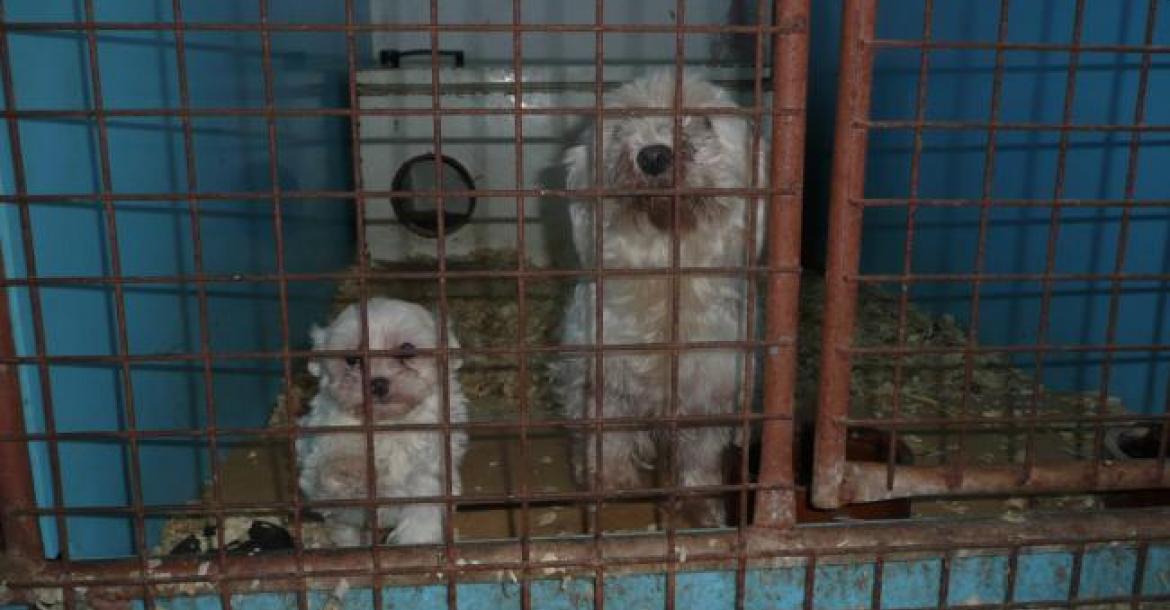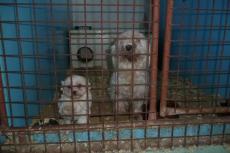Puppymill-pups have a bad start from the beginning
For dog lovers actually no news, but a confirmation what every dog lover already knew. Puppies, born in a 'puppy mill' (or at a large commercial dog farm) start their lives with a decent backlog. A backlog that may no longer be made up.
The most recent study comes from England, and was held among 2026 participants with dogs. 123 dogs came from a puppy farm, 201 dogs had an unknown origin, more than 1700 dogs came from a regular good (occasional) breeder. All owners filled in the mini-C-BARQ, a system to classify the behavior of the dog. New to this C-BARQ were four new scales, added by the Scottish animal welfare organization SSPCA, to specifically measure the behavior of puppies from the large commercial trade and illegal trade. A total of 14 characteristics ('scales') were looked at for all puppies.
Puppies from breeding farms and illegal trade (including breeding farms) scored significantly lower on 11 of the 14 scales than puppies from (breed) dog breeders with a single litter. In other words, they had unwanted behaviors more often. The "early-life experiences" proved essential for the later behavior. Even something as simple as walking around with the puppies turned out to significantly reduce the chance of undesirable behavior. Also different methods of puppy training appeared to have a clear influence on the behavior of the puppies. Besides behavioral problems, the 'trade' pups also appeared to have a significantly poorer health.
The same picture was already included two years ago in the first study of puppies of traders and farms. Dogs bred on puppy farms appeared to be more aggressive, more anxious for other dogs and were more likely to lose anxiety as an adult dog than dogs from respected breeders. In addition, three specific breeds were looked at, the Pug, Chihuahua and Jack Russell. "We discovered that in all categories of behavior, including trainability, dogs from less responsible breeders had significantly less favorable behavior and temperament scores than puppies from responsible breeders" was the conclusion from that study.
A literature review of (mainly American) research has already concluded this. "The most consistent finding in all studies is an increase in aggression, which is usually aimed at dog owners and family members, but also at unknown people and other dogs. Increased anxiety was also seen as a reaction to unknown people, children and other dogs. Undesirable behavior related to separation and / or attention seeking and increased sensitivity to touch have been reported.
Because of the way in which dogs that are sold through pet stores and / or that are born in commercial breeding farms are bred, housed, weaned, transported, treated, adopted and raised, there are numerous factors that can contribute to these reported outcomes. Some key factors are genetics, stimulant deprivation in early life (inadequate stimulus exposure, inappropriate or lack of social exposure), stress (prenatal maternal stress in the mother and postnatal problems in early life), early weaning and maternal separation, transport and factors that have to do with the owner, such as insufficient knowledge and experience with dogs and different levels of involvement with the dog.
Although the research was done in England and the US, it is unlikely that very different results can be expected in the Netherlands and Belgium. In the Netherlands only about 30-50,000 puppies per year come from puppy farms and illegal trade.
source
Using the mini C-BARQ to investigate the effects of puppy farming on dog behavi…





